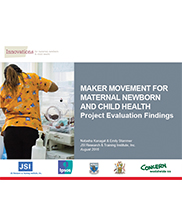Maternal mortality in Kenya decreased from 687 to 510 deaths per 100,000 live births between 1990 and 2015, a 26% reduction far short of the Millennium Development Goal (MDG) target of 75% reduction by 2015. Although no longer current, the MDG target was an important goal during the lifetime of the Maker Movement for Maternal, Newborn and Child Health (MNCH) project. Neonatal mortality also decreased in the country, dropping from 27 deaths per 1000 live births in 1990 to 22 deaths per 1000 live births in 2015. However, when population growth is considered, the overall number of neonatal deaths has increased since 1990.
Medical equipment is especially important for maternal and newborn health. Equipment is used in everything from normal delivery, caesarean section and routine neonatal care to case management of maternal complications and advanced newborn care, including postoperative care for mothers and newborns. This equipment is often unavailable in low-resource settings owing to challenges with cost, imported or donated equipment that is not tailored to meet country needs, limited human resource and heath infrastructure capacity, and lack of standardized regulatory protocols. When equipment is available, it is often in a state of disrepair and nonfunctional for multiple reasons, including prohibitive costs for procuring replacement equipment and spare parts, inefficiencies in the supply chain, and equipment designs that are not tailored to meet local needs.
The Maker Movement for Maternal, Newborn and Child Health (Maker) was a pilot project implemented as part of the Innovations for MNCH (Innovations) initiative. Maker, implemented in Kenya, aimed to address gaps in the supply and availability of functional MNCH medical equipment at Kenyatta National Hospital (KNH) and lower-level facilities that are responsible for helping women deliver. The Maker pilot forged strong partnerships between the physicians, nurses, and biomedical engineers at KNH and the engineers at the UoN Fab Lab to build new pieces of equipment or spare parts for select MNCH equipment and improve the supply, availability, reliability and affordability of the equipment.
Innovations was implemented by Concern Worldwide and JSI R&T served as the global research partner. This report documents the pilot’s period of implementation and evaluates its effectiveness in achieving objectives, with a focused exploration of the pilot’s use of human-centered design principles and techniques.
Natasha Kanagat & Emily Stammer, JSI Research & Training Institute, Inc. 2016.


